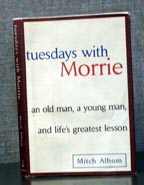MONDAYS WITH MORRIE
By Mitch Albom
175 pp. New York:
Doubleday. $21
In a fine testament to literary underachievement, Mitch Albom has once again successfully transcribed his former professor’s reflections on life and death during a specific day of the week. In yet another edition to his multi-volume series, Albom has come full circle, letting no day of Morrie Schwartz’s diseased-ridden life go by without publishing a best-selling book about it. In "Mondays with Morrie," Albom returns to life’s greatest lesson, reiterating former claims that it has something to do with appreciating loved ones and nothing to do with economic status. The lesson, however, is becoming increasingly harder to accept as Albom has transformed an old man’s deathbed into a multi-million dollar enterprise. Movie deals. Action figures. A cross-promotional giveaway with every purchase of a Happy Meal (for a limited time only). But perhaps Albom’s sense of integrity is best exemplified in an ongoing series of commercials in which he reveals that Morrie’s greatest lesson involved a cost-effective method of calling people collect.
On the other hand, there seems to be a growing market for stories about the terminally ill as other authors have pole-vaulted onto the bandwagon with such titles as "Januaries with Abe," "Winters with Bernie," and the recent South American cult hit "Martes con Paco." In light of this, it is no wonder that W. W. Norton & Company is releasing "The Best Terminally-Diseased Writing of 2001," in time for the holiday season.
In spite of these popular imitations, the degenerative muscle-tissue of Morrie has remained a fan-favorite. That said, it has become evident that even the master of milking sentiment is having difficulty dragging this premise any further. "Wednesdays with Morrie" explored the inner-beauty of nature. "Thursdays with Morrie" discussed the benevolence of faith. By the time Albom reached Sunday, his memoirs were detailing methods of turning atrophy into a sizeable tax deduction.
Unfortunately, the lessons in this book lack any worth whatsoever. "It is important in life not to mix jealousy with coleslaw," mumbles Morrie in a state of half-consciousness. In the same vein, it is doubtful that a younger, healthier Morrie would ever instruct his students "to perform liposuction on their pets for hygienic reasons." Yet these are the maxims that the jacket of the book refers to as "words of wisdom for ages to come."
For the most part, the lessons in this book are less philosophical and more practical. One inspirational episode describes how Morrie teaches his students to operate a remote control with one’s chin. "Everything works out," Morrie says, "as long as you’re not too worried about picking a specific channel."
Anyone acquainted with Albom’s formula will feel right at home in the latest edition of Morrie’s lectures. Not surprisingly, we find Albom in the throes of a mid-life crisis as he records the death of his idol on a weekly basis. But Albom’s whining is becoming exceedingly tiresome as he continues to discuss the effects of amyotrophic lateral sclerosis with the same degree of despair as male pattern baldness.
The idea of a slow death has obviously captivated Albom from the beginning. In this book, Albom becomes increasingly obsessed with the fact that Morrie’s body turns numb, and reaffirms this fact by subjecting the old man to a variety of harsh conditions. "It was simply amazing. No matter how hard I flicked this man’s ear, he continued to drool on his shirt in silence." We also learn that toward the end of his life, Morrie could be left outside in the rain for hours without being disturbed in the slightest.
In addition to summarizing Morrie’s weekly sermons, Albom continues to include college memories of his mentor. Here, too, the writing appears strained and occasionally gives the impression of being completely fabricated. This seems to be the case when, for the first time, Albom discusses the period in the late seventies when he and Morrie were roommates. As Morrie’s body rapidly deteriorates, Albom regrets the countless times he scolded him for not doing the dishes, forgetting to write down messages, and leaving an empty container of orange juice in the refrigerator. In deep reflection, Albom laments, "To think I once let such nonsense cause friction in our friendship… If I only knew then what I know now." He then goes on to describe the time they tried to raise money for a backpacking trip across Europe by selling posters out of a van.
Like the theme song to "Happy Days," Albom has covered every day of the week and has hopefully fulfilled whatever he originally set out to do. It is highly unlikely that when Albom first stepped onto Morrie’s driveway four years ago, that the old man had any idea that he would have a posthumous celebrity status comparable to Tupac Shakur. Indeed, it seems like even Albom is getting bored with the premise. He readily admits that on many Mondays he failed to even visit Morrie, phoning the nurse instead and inquiring "if the guy in the wheelchair said anything interesting."
According to one inside source, however, Albom is far from exploiting the possibilities of the Morrie franchise. Browsers will soon see small gift-sized pamphlets at the front of their local bookstores with titles like, "The Wit and Wisdom of Morrie," "The Tao of Morrie," and "Morrie’s Little Instruction Book." Albom, himself, might be the one who has revealed life’s greatest lesson: why beat a dead horse when you can write about it?
Prescott Tolk is a writer-in-residence at the Learning Annex and recently published the collection of philosophical essays "Do Old People Matter?"
